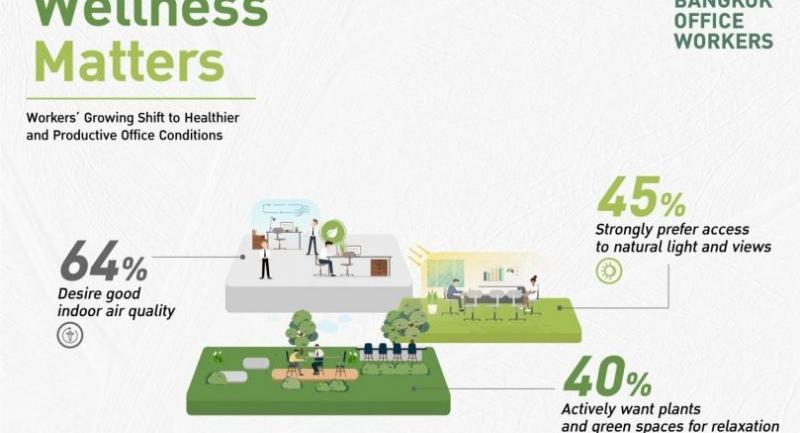What we expect from our working lives

A Bangkok-focused survey reveals that while convenient location and access to mass transit remain primary requirements, a major shift in employees’ requirements for wellness, comprehensive services and smart building technology will drive the city’s future leading workplaces.
The survey, which was undertaken by Nielsen Thailand, in collaboration with The PARQ by TCC Assets (Thailand) and managed by Frasers Property Holdings (Thailand), identified core trends in Bangkok’s office working population with regards to the time they spend at work.
The survey, conducted in November, encompassed 400 respondents living in Bangkok aged 25 to 45, with an equal gender distribution, working for both Thai and international companies. The objective was to gain insights about Bangkok’s workers current work-life circumstances and their attitudes towards their workspace, to better understand how office space plays a role in both job selection and satisfaction, and to help plot upcoming office space trends for both employers, and commercial real estate developments.
Office location is extremely important
For 92 per cent of respondents, an office’s location was voted as extremely important and important, with location subsequently voted as the most significant factor for future Bangkok office satisfaction. And with surveyed worker’s daily commute time an average of 60 minutes, combining two to three transport means, 91 per cent of those surveyed rank proximities of their office building to public transport as very important, with access to mass transit gaining the highest score in importance of direct access from office buildings (69 per cent).
Younger workers are placing more importance on convenience and proximity than ever before. Overall 72 per cent of respondents said they’d prefer to walk less than 500m from their office to the nearest BTS / MRT station, with the 25-30 years old almost twice as likely as the other age groups refusing to walk more than 100m to public transport (13 per cent) and twice as likely to travel to work less than 30 minutes daily compared to all other age groups (31 per cent), with 85 per cent of the 25-30 years old respondents using BTS / MRT for their commute. Executive level employees aged 41-45 had the longest commute overall, with 37 per cent travelling more than 90 minutes to the office.
Another key trend shows the office building is more than just a workplace. The survey highlighted three major factors that help increase workplace satisfaction, such as comprehensive services on property (43 per cent), good safety and security (42 per cent) as well as greenery and public areas for relaxation (36 per cent).
Comprehensive services are key when choosing an office building
One of the main findings of the survey shows that convenience is the most important factor when choosing an office building – from its location to the services offered on site, shifting attitudes in the office workers’ preference show that the presence of a food court, convenience store, a gym or after work dining options on site are far more important to today’s generation of office workers, being chosen as the top 4 value-adding services.
When asked if healthy food availability at the office will help them eat more mindfully, 92 per cent definitely and strongly agree. Office workers also strongly agree that fitness facilities in their office building and being nearby a public park, will allow them to exercise more frequently (93 per cent of respondents).
Safety and energy management systems are top smart tech office requirements
Smart technology is one of the key factors that all age groups have in common as a must-have in their office building. While 62 per cent of respondents say security systems are most important for a modern office building, energy management systems comes second at 50 per cent, showing an increased concern for environmentally friendly buildings. Smart car parking is also in the top three, counting 47 per cent of the respondents’ choices.
By gender, more women prefer hand-free automated toilet systems for better hygiene and convenience (46 per cent) than men, whereas men place higher importance on electric vehicle charging stations (16 per cent and 9 per cent respectively). Younger generations place importance on having customer service mobile apps at the office building, at a rate of 46 per cent, almost double their older counterparts, reflecting the same digital trends seen in society. Growing awareness of sustainability at the workplace can also be seen in the high preference for recycling and water management systems in office buildings (40 per cent).
Top Factors to Enhance Productivity and Workplace Satisfaction
Reflecting a global shift towards better health and wellness-focused trends, the survey revealed office workers seeing top-rated factors to improve productivity and wellbeing as being: good indoor air quality (64 per cent), access to natural light and views (45 per cent) and plants and green spaces (40 per cent). More access to fitness and relaxation facilities on site in 39 per cent of choices are a clear indication of a shift towards wellness-focused trends.
Conversely, city office workers were united in their greatest office building concerns of uncomfortable working conditions (41 per cent), and poor air quality (40 per cent).
“By understanding the evolving expectations of office workers, the growing awareness of convenience and quality of life, executives can improve their ability to attract and retain talents by creating a work space that integrates wellness, smart technology, and natural spaces,” says Viraj Juntani, executive director of Consumer Insights, Nielsen Thailand. “The uncovering of important measures in modern Bangkok office (features, location and facilities) and the ability to leverage the understanding of those measures is one of the keys towards increasing employee satisfaction.”





